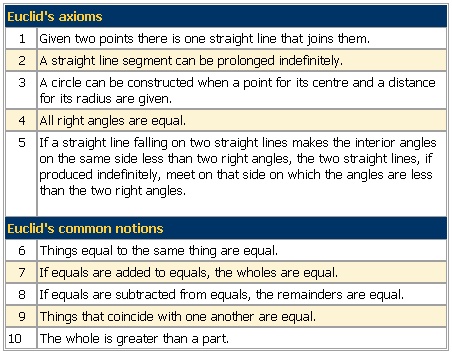Euclid's axioms and common notions
- Euclid's axioms and common notions
-
Euclid's axioms
01 Given two points there is one straight line that joins them.
02 A straight line segment can be prolonged indefinitely.
03 A circle can be constructed when a point for its centre and a distance for its radius are given.
04 All right angles are equal.
05 If a straight line falling on two straight lines makes the interior angles on the same side less than two right angles, the two straight lines, if produced indefinitely, meet on that side on which the angles are less than the two right angles.
Euclid's common notions
06 Things equal to the same thing are equal.
07 If equals are added to equals, the wholes are equal.
08 If equals are subtracted from equals, the remainders are equal.
09 Things that coincide with one another are equal.
10 The whole is greater than a part.
See as table:
* * *
Universalium.
2010.
Look at other dictionaries:
Euclid — /yooh klid/, n. 1. fl. c300 B.C., Greek geometrician and educator at Alexandria. 2. a city in NE Ohio, near Cleveland. 59,999. * * * flourished с 300 BC, Alexandria, Egypt Greek mathematician of antiquity, known primarily for his highly… … Universalium
Euclid's Elements — (Greek: polytonic|Στοιχεῖα) is a mathematical and geometric treatise consisting of 13 books written by the Greek mathematician Euclid in Alexandria circa 300 BC. It comprises a collection of definitions, postulates (axioms), propositions… … Wikipedia
Euclid — Infobox Scientist name = Euclid image width = caption = birth date = fl. 300 BC residence = Alexandria, Egypt ethnicity = Greek field = Mathematics known for = Euclid s Elements Euclid (Greek: . polytonic|Εὐκλείδης mdash; Eukleidēs), fl. 300 BC,… … Wikipedia
Spinoza: metaphysics and knowledge — G.H.R.Parkinson The philosophical writings of Spinoza are notoriously obscure, and they have been interpreted in many ways. Some interpreters see Spinoza as (in the words of a contemporary)1 ‘the reformer of the new [sc. Cartesian] philosophy’.… … History of philosophy
Science and the Church — • Dicsusses the relationship between the two subjects Catholic Encyclopedia. Kevin Knight. 2006. Science and the Church Science and the Church … Catholic encyclopedia
Logic and the philosophy of mathematics in the nineteenth century — John Stillwell INTRODUCTION In its history of over two thousand years, mathematics has seldom been disturbed by philosophical disputes. Ever since Plato, who is said to have put the slogan ‘Let no one who is not a geometer enter here’ over the… … History of philosophy
Tarski's axioms — Tarski s axioms, due to Alfred Tarski, are an axiom set for the substantial fragment of Euclidean geometry, called elementary, that is formulable in first order logic with identity, and requiring no set theory. Other modern axiomizations of… … Wikipedia
Whewell’s philosophy of science and ethics — Struan Jacobs ON SCIENCE Introduction Among the most prodigious of English minds of the nineteenth century, William Whewell (1794–1866) was at various times, and among other things, philosopher, intellectual historian, scientist, educationist,… … History of philosophy
Euclidean geometry — A Greek mathematician performing a geometric construction with a compass, from The School of Athens by Raphael. Euclidean geometry is a mathematical system attributed to the Alexandrian Greek mathematician Euclid, which he described in his… … Wikipedia
non-Euclidean geometry — geometry based upon one or more postulates that differ from those of Euclid, esp. from the postulate that only one line may be drawn through a given point parallel to a given line. [1870 75; NON + EUCLIDEAN] * * * Any theory of the nature of… … Universalium

